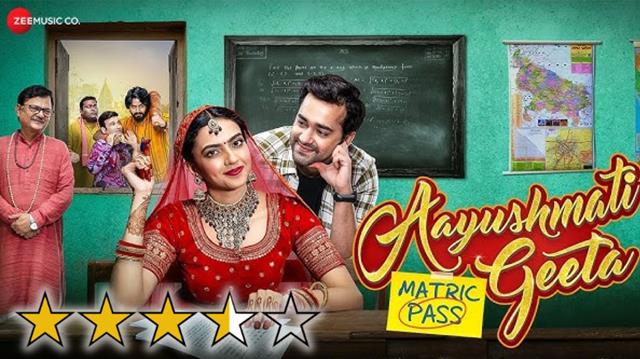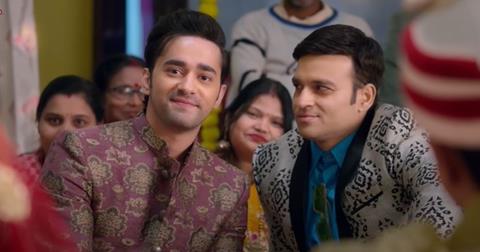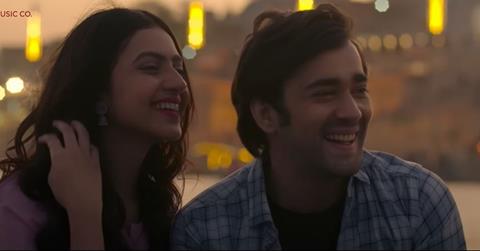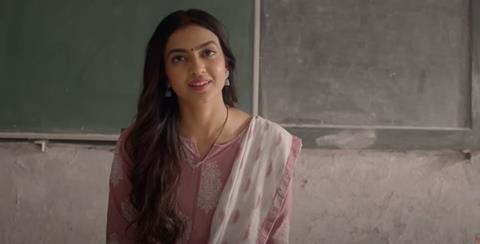Review: 'Aayushmati Geeta Matric Pass' unveils a promising Kashika Kapoor under Prradip Khairwar's direction
Aayushmati Geeta Matric Pass is a heartfelt film that carries a socially relevant message, wrapped in a simple yet engaging love story.
Published: Wednesday,Oct 16, 2024 12:30 PM GMT-06:00

Aayushmati Geeta Matric Pass offers a heartwarming and socially relevant story, highlighting important themes such as women’s education, gender equality, and the struggle against societal norms in rural India. Directed by Prradip Khairwar, in his debut, the film mixes humor, drama, and romance, all while presenting a strong message about the transformative power of education.
Plot and Premise

The movie is set in a small village in Uttar Pradesh, where societal norms often dictate the path of a young woman’s life—typically marriage over education. The central story follows Geeta Tripathi (Kashika Kapoor), a determined young woman who repeatedly struggles to pass her 10th-grade matriculation exams. Her father, Vidyadhar Tripathi (Atul Shrivastava), plays a significant role in her life, as he believes that education is more important than simply settling her down in marriage. His strong stance against marrying her off until she passes her exams creates tension, especially when a promising marriage proposal for Geeta is rejected on this basis.
Kundan (Anuj Saini), a simple boy who has only studied up to the 8th grade, falls in love with Geeta at a marriage ceremony. Despite their families initiating talks for their marriage, Geeta’s exam results once again bring disappointment. Her father’s insistence on her passing the exams leads to complications, especially as Kundan’s mother, Malti (Alka Amin), sees the condition as unreasonable. The film then explores Geeta's struggle to fulfill her educational goals while navigating the love and support she receives from Kundan. What follows is a journey of social resistance, self-determination, and a sweet yet challenging romance.
Writing and Direction

Prradip Khairwar and Navnitesh Singh, the writers, present a deeply relevant and familiar story. Education, particularly for girls in rural India, remains a contested issue, and this film captures the real-world conflicts that many families face. While the film covers familiar territory, it handles the subject with sincerity.
One of the film’s strengths is how it highlights the contrast between the traditional views of the older generation and the emerging ideas of younger individuals like Geeta and Kundan. The film subtly criticizes patriarchal values while showing the importance of progressive attitudes towards women’s education.
Screenplay and Pacing

The screenplay follows a relatively predictable arc, but that doesn’t detract from its impact. While there are moments when the film feels slightly stretched, especially in the middle, the overall pacing keeps the viewer engaged. The humor provided by Pranay Dixit’s character, Bunti, lightens the tone at times, giving the film a mix of emotional and comedic beats. The love story between Geeta and Kundan, although conventional, is endearing and gives the film its heart.
Performances

Kashika Kapoor, in her debut as Geeta, is undoubtedly the star of the film. Her portrayal of a village girl who strives to pursue her education is nuanced and believable. She convincingly conveys the innocence and quiet determination of Geeta, making her a character the audience can root for. Kapoor brings a natural charm to her role, which is crucial to the film’s emotional impact.
Anuj Saini as Kundan delivers a sincere performance, perfectly complementing Geeta's character. His portrayal of a supportive partner who breaks away from traditional male ego is refreshing. The chemistry between Kapoor and Saini is gentle yet believable, adding depth to their love story.
Atul Shrivastava, playing Geeta’s father, is another highlight of the film. His performance as a progressive father who values education over societal expectations is both heartwarming and convincing. Alka Amin, as Kundan’s mother, strikes a fine balance between being comedic and serious, adding an extra layer of complexity to the family dynamics. The supporting cast, including Pranay Dixit, provides much-needed humor, ensuring that the film doesn’t get too heavy-handed with its social message.
Setting and Music

The setting of Aayushmati Geeta Matric Pass captures the rural landscape beautifully, adding authenticity to the story. The village setting, with its scenic shots of Uttar Pradesh, including the iconic Banaras, feels like an integral part of the film, grounding the story in a very real context. The visuals complement the film’s tone, giving it a down-to-earth charm that suits the narrative.
The music by Sanjeev Anand is melodious and suits the film’s mood, though it doesn’t stand out as a major element. Tracks like "Rangreza" sung by Rekha Bhardwaj leave a lasting impression and enhance the emotional depth of the film.
The Misses

While the film succeeds in delivering its core message, it needs to improve in a few areas. The screenplay, though generally engaging, sometimes lacks tightness. A few scenes, particularly those involving the subplot of the education scam, feel underdeveloped, leaving viewers wishing for a more streamlined focus. The pacing, though generally steady, could have been improved by trimming some of the more repetitive moments in the middle of the film.
Additionally, while the film attempts to address multiple societal issues, it sometimes feels like it bites off more than it can chew. The attempt to cover a range of topics—education, gender inequality, corruption in the system—results in some elements being overshadowed by others.
The Verdict
Aayushmati Geeta Matric Pass is a heartfelt film that carries a socially relevant message, wrapped in a simple yet engaging love story. The movie is a sincere effort to highlight the importance of education for women and the dismantling of patriarchal norms.
Rating
***1/2 (3.5/5) stars
Your reaction
 Nice
Nice Awesome
Awesome Loved
Loved LOL
LOL OMG
OMG Cry
Cry Fail
Fail
















Comments (0)